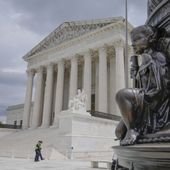COLORADO SPRINGS — Members of the dissident Grace and St. Stephen’s Episcopal Church have voted overwhelmingly to split from the Episcopal Church and join the conservative Anglican convocation, church officials announced yesterday.
The Rev. Don Armstrong, church rector and leader of the breakaway movement, said yesterday that 93 percent of participating parishioners voted to leave the national church and Colorado Diocese.
At the same time, 94 percent voted to retain the church’s historic, 134-year-old building, despite demands from the bishop to vacate the property and return it to the diocese. The balloting, which began May 20 and concluded yesterday morning, drew 370 voters.
“I’m delighted,” Mr. Armstrong said. “Ninety-three and 94 percent — it doesn’t get much better than that.”
The parish election affirmed an earlier decision of the church’s vestry, which voted March 26 to secede from the increasingly liberal Episcopal Church and join the conservative Convocation of Anglicans in North America (CANA) after disputes with the diocese over theology and finances.
Without parish support, however, the vestry vote would have been meaningless, Mr. Armstrong said.
“This is the way CANA is asking people to come to them — not only does the vestry vote, but the entire congregation votes,” said Mr. Armstrong, who has led the congregation for 20 years. “If we’d have lost this vote, I would be emptying out my office.”
The diocese decried the parish vote, insisting it had no legitimacy under church law, and renewed calls for Mr. Armstrong and other church leaders to vacate the building.
“The ‘vote’ being taken this week by the secessionist group that now illegally occupies Grace and St. Stephen’s Church in Colorado Springs has no legal validity or bearing on the current efforts by the Diocese of Colorado to regain rightful control of its property,” the diocese said.
Mr. Armstrong, who has long battled with Colorado Bishop Rob O’Neill over the church’s leftward direction, said the diocese’s opinion on the vote is irrelevant.
“My response is that Bishop Rob O’Neill is an illegal, apostate bishop,” he said. “I’m no longer under his authority, nor do I care what he thinks.”
Hundreds of Episcopal parishes have left the denomination in disputes over the church’s move leftward, notably its 2003 decision to support same-sex blessings and the ordination of V. Gene Robinson, an openly homosexual bishop in New Hampshire.
In Virginia, the Episcopal Church and state diocese are suing 11 churches, their clergy and lay leaders for leaving the diocese last winter.
The departure of Grace and St. Stephen’s is a bitter loss for the Colorado Diocese. With average Sunday attendance of about 800 worshippers, the church was the largest in the diocese, with an active membership that had donated generously to the church’s upkeep.
The parish’s clergy also was considerably more conservative than the diocese, and an already tense relationship exploded in December when it began an investigation into whether Mr. Armstrong had misapplied church funds.
Mr. Armstrong was placed on suspension, then defied the bishop’s authority by retaking control of the church in March. Within days, the vestry had voted to secede from the denomination.
Bishop O’Neill denounced the move and accused the rector of misappropriating hundreds of thousands of dollars in church funds. Officials said Mr. Armstrong, who has denied the charges, will be tried in church court, even though the rector said he no longer recognizes the denomination’s authority.
“The seizing of property rightfully belonging to the Episcopal Church is nothing more than a sadly misguided effort to restore to a position of public trust a priest who is currently under ecclesiastical indictment for the misappropriation of church funds,” the diocese said.
The diocese and Grace and St. Stephen’s are now skirmishing in court. The church filed a request for relief last month in El Paso County District Court to stop the diocese from freezing its accounts, saying the parish now exists “free of any claims of ownership by the bishop and the Diocese of Colorado.”
The diocese followed with a counterclaim asking to be declared the rightful owner of the church.
Though the court hearings could drag on for years, Mr. Armstrong isn’t waiting to celebrate the parish’s vote. Sunday attendance has now stabilized at about 600, and at services today, he said, the church will display the CANA banner for the first time in its processional.
“After being here for 20 years,” Mr. Armstrong said, “it’s like starting all over again.”



Please read our comment policy before commenting.